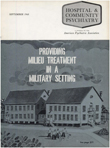Brief Hospital Treatment of Schizophrenia—Early Results of a Multiple - Hospital Study
Abstract
IN SUMMARY, our early findings seem to justify the following tentative conclusions:
• Intensive time-limited treatment is feasible. Compared with routine hospital treatment, it results in a modest reduction in florid symptoms in a larger number of patients.
• Despite their shorter stay, patients in the brief-treatment group showed no greater rate of readmission, nor was their mean time outside significantly different from that of controls who had received normal hospital care.
• Regardless of the actual number of days of hospitalization, an intensive aftercare program seems to play an important role in reducing or preventing readmissions.
• In trying to determine just how brief a brief inpatient treatment program should be, we must consider a number of reality factors, such as individual differences between patients, patient-staff ratios, difficulties in establishing maximally effective drug dosages, and the availability of community aftercare facilities.
Access content
To read the fulltext, please use one of the options below to sign in or purchase access.- Personal login
- Institutional Login
- Sign in via OpenAthens
- Register for access
-
Please login/register if you wish to pair your device and check access availability.
Not a subscriber?
PsychiatryOnline subscription options offer access to the DSM-5 library, books, journals, CME, and patient resources. This all-in-one virtual library provides psychiatrists and mental health professionals with key resources for diagnosis, treatment, research, and professional development.
Need more help? PsychiatryOnline Customer Service may be reached by emailing [email protected] or by calling 800-368-5777 (in the U.S.) or 703-907-7322 (outside the U.S.).



